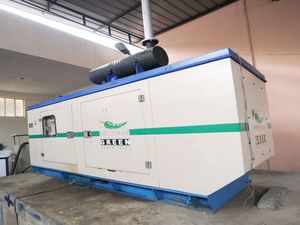
Role of Power Generators in Modern India
Electricity is a lifeline that people in the 21st century cannot do without. Most kinds of activities whether they are commercial, industrial or household need electricity to perform. Typically, electricity boards supply electric power (known as grid power) for industrial, commercial and residential use with a promise to supply continuous power 24/7. This form of supply helps fixed establishments such as a factory, a shop or a house to execute their day-to-day activities without any disruption. But there are other activities such as drilling a borewell in a remote area, conducting a film shooting outdoors or a construction site which also need electric power to function but there is no grid power supply. Further, when the grid power supply is interrupted due to a power cut, daily life activities of several dependants come to a grinding halt. In such cases, generators as external sources of electric power come to the rescue and they become the lifeline so that necessary activities which require electricity to function do not suffer.
The generator industry comprises three major stakeholders – manufacturers, distributors/suppliers and dealers. Each of them has a specific role to play in the development of the industry.
Generator Manufacturer
The generator manufacturer industry in India is operated by several large manufacturers and a huge number of smaller manufacturers. They manufacture quality generators of varying sizes in compliance with Indian and international standards. These include ISO 8528 for generating set, ISO 10000 (naturally aspirated) for engines, BS 5514 for reciprocating internal combustion engines, IS, IP and IEC standards for alternators, IS and ISO standards for acoustic enclosures and IS and ISO standards for control/AMF panels. Besides, they also comply with notifications and guidelines issued by the Central Pollution Control Board (CPCB) in regard to various parameters including noise and emission. These manufacturers invest heavily in setting up state-of-the-art facilities for the production of high-quality generators. The two main types of generators produced include diesel generators and gas-based generators. Off late, manufacturers have shown interest in manufacturing hybrid generators that depend on both solar and fuel energy.
The production of generators generally falls into categories based on KVA Ratings mentioned below:
- 5 KVA – 75 KVA
- 75.1 KVA – 375 KVA
- 375.1 KVA – 750 KVA
- 750.1 KVA – 1,000 KVA
- 1,000.1 KVA – 2,000 KVA
- Above 2,000 KVA
From among these groupings, 5 KVA – 75 KVA generators have the highest market share because of their utility in a wide range of applications. Besides, these generators are easily available at an affordable price. Higher rated generators find uses in heavy-duty applications such as borewell digging, cement mixing and other construction and mining activities.
Generator manufacturers also produce portable generators that find uses in millions of establishments across the country to serve as a source of standby power in times of power cuts from grid supply.
Generator manufacturers also focus on fuel efficiency and low cost of production.
Generator Distributor/Supplier
The generator market follows a two-tier distribution system covering distributors and dealers. Typically, a dedicated state generator distributor or generator supplier represents the manufacturer in a particular state under whom dealers representing different districts in the state operate. The function of distributors is to develop the market in the territories allotted to them by appointing dealers to cover all the customer segments. Each distributor in consultation with the manufacturer would appoint as many dealers as required. The distributor also handles the training of dealers on the functioning of generators. The distributor stocks the generators required in the market and offers credit facilities to dealers.
The generator market has several important segments based on parameters that include KVA ratings and the end user. For instance, the end user segment comprises:
- Commercial – retail, offices, shops, hospitals, and hotels
- Industrial – manufacturing, energy generation, drilling, mining and transportation
- Residential – homes and small offices
Often, a generator manufacturer supplements the distributor’s effort with support from a company representative dedicated to facilitating the end user.
The industry follows a service system that is separate from the sales system. Each generator manufacturer appoints a service intermediary to take care of all service requirements. The service function keeps pace with the requirements of the market by setting up call centres to ensure speedy redressal of any service issues.
Generator Dealer
A generator dealer is the primary point of contact for the customer or end user. The distributor trains dealers, including portable generator dealers, on all aspects of sales with adequate support from the marketing team of the generator manufacturer. The generator dealer systematically taps the end users located in the territory by making cold calls and attending to leads generated by the generator manufacturer’s marketing efforts through advertising and sales promotion activities. The generator dealer is responsible for maintaining a cordial relationship with the end user and takes care of any problematic issue by liaising with the distributor and the manufacturer. In short, the dealer becomes the fulcrum on which the success or failure of the generator manufacturer’s business rests. Typically, a generator dealer performs tasks that include installation and periodic maintenance of generators. A generator dealer is also the point man for ensuring that the services required to keep the generator running without any hitches are rendered.
[“source=economictimes.indiatimes”]




